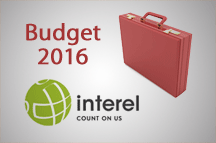The Chancellor of the Exchequer has today unveiled his 2016 Budget. Amidst global economic uncertainty, a divided Conservative Party and the approaching EU Referendum, many expected this Budget to be understated and frankly dull. However, there are important announcements regarding personal finance, corporate tax regimes, health and education. This is an overtly political budget from the ambitious Chancellor, who is looking to secure the UK’s economic recovery and his leadership agenda in one swoop.
1. The UK’s recovery is not secured
The Chancellor opened his budget with a raft of gloomy figures from the OBR. Considering the poor global outlook, the UK’s domestic growth and productivity growth were both revised down from Autumn Statement estimates, and the Chancellor’s own fiscal target on the UK’s debt-GDP ratio has been missed. While the country is enjoying record employment and is on course for a £10.4 billion surplus by 2020, Mr Osborne’s entire budget was predicated on global uncertainty.
2. Tax breaks for business
The Chancellor announced a cut to Corporation Tax from 20% to 17% to take effect from 2020, which will cement the UK’s status as the G7 nation with the lowest rate of Corporation Tax. He also announced the increase of Business Rates thresholds, from £6000 to £15,000 for the lower rate, and from £18,000 to £21,000 for the headline rate. Both the headline rate and base rates of Capital Gains tax were reduced by 8% respectively. The Chancellor also promised to clamp down on tax avoidance by multinational firms, and to stop micro-traders from abusing platforms like EBay and Amazon by storing goods in the UK and selling them abroad without paying any VAT.
3. More Devolution
There were new funds announced to catalyse existing devolution and growth deals for National Assemblies and City Regions. There will also be a new East Anglian Combined Authority, City Region deals for Cardiff, Swansea and Edinburgh, and Combined Authorities for Greater Lincolnshire and the West of England. Finally, Libor Fines will go towards a new Air Ambulance Scheme for Northern Ireland. As the Chancellor remarked, ’’the devolution revolution is taking hold’’.
4. Housing and Planning
The Chancellor announced plans to speed up the planning process to deliver more homes. He chose not to touch Buy-to-Let as some predicted he would, but an uplift in Stamp Duty Land Tax on non-residential properties was announced, which will fund a £115 million effort to tackle homelessness and rough sleeping.
5. Investment in Infrastructure
Further investment in the Northern Powerhouse was unveiled, as the Chancellor gave a thumbs up to HS3, a series of Northern road upgrades, and a trans-Pennine tunnel road from Manchester to Sheffield. London’s Crossrail 2 also got the go-ahead, along with upgrades to rail links in the South-West and East of England to boost their flood resilience.
6. Education, Education, Education
New funding was announced to extend the school day past the ‘’Victorian’’ 3.30 finish, and convert every Primary and Secondary school in England into an Academy. These reforms have certainly raised eyebrows, though the Department for Education is pressing ahead and publishing a White Paper tomorrow setting out further details. The National School Funding Formula and programs to improve quality of Education in the North also received cash boosts.
7. Health
After appearing to back down on the issue earlier this year, the Chancellor unveiled a tax on sugary drinks will come into force in two years’ time. This banded levy will raise £520 million for the Treasury, to be spent on funding sport in primary schools, alongside a fresh injection of LIBOR fines into children’s hospital services in English cities.
8. Excise Duties
The Chancellor announced changes in excise duties in the budget, including increases to Wine Duty in line with inflation and Tobacco Duty 2-3% above inflation. Notable were the freezes on Beer, Cider and Fuel Duty, measures obviously intended to glean popular support for the Chancellor.
9. Personal Finance
Several announcements to ease financial pressure on working families were announced. The ISA limit was lifted from £15,000 to £20,000, and a new ‘’Lifetime ISA’’ was announced, which rewards savers under 40 years old with £1000 for every £4000 they save. Category 2 National Insurance Contributions for the Self-Employed were scrapped altogether. Middle and low earners were given a boost as the personal allowance was raised to £11,500, and the threshold for the 40p tax rate was increased to £45,000. With increases to National Minimum Wage for 16-24 year olds also announced, the Chancellor has tried to underline his argument that the Conservatives are the Party of working people.
10. The EU
The Chancellor’s speech would not be complete without a reference to the impending referendum. He used the opportunity to heartily endorse the UK’s continued membership of the EU, and cited the OBR’s assertion that a Brexit would lead to uncertainty and volatility. Many expected the Chancellor to strike a more delicate tone on Europe, considering the scale of division within his Party. Although, the Chancellor’s leadership ambitions are predicated on economic credibility and a Remain vote this June. If he can deliver on both of these objectives, then he will be well placed to succeed David Cameron as leader of the Conservative Party.












